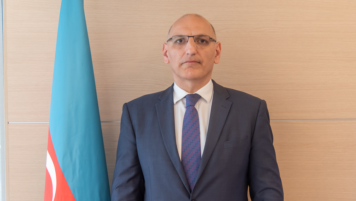By Aram Arkun
Mirror-Spectator Staff
BELMONT, Mass. — On October 13, Hayk Demoyan delivered a lecture ominously entitled “The End of the Third Republic? Or, What to Expect for Armenia’s Future” at the National Association for Armenian Studies and Research (NAASR) in Belmont, as part of the Calouste Gulbenkian Foundation Lecture Series on Contemporary Armenian Issues. The title did not mislead, as Demoyan delivered what might be considered a “wake-up call” for the diaspora.
Demoyan has been director of the Armenian Genocide Museum-Institute in Yerevan since 2006, and from 2011 to 2015 served as the secretary of the State Commission on Coordination of the Events Dedicated to the Commemoration of the 100th Anniversary of the Armenian Genocide. He is the author of twelve books on topics ranging from aspects of the Armenian Genocide to Armenian sports in the Ottoman Empire.
Demoyan is a public figure in Armenia who, although sometimes associated with the political establishment because of the positions he has held, has not been a stranger to controversy. He presented himself at NAASR on a more basic level, saying, “I am not going to provoke anything. I am a scholar and I am a citizen. I feel myself obliged to share with you some thoughts and anxieties as a person, an Armenian, from Armenia.” He declared that he is not and has never been a member of any political party.
Demoyan identified himself as an eyewitness and survivor of the cataclysms and changes of the past 25 years of Armenian independence, and he showed 25 photographs in slides accompanying his talk to remind the audience just what the people in Armenia have passed through. In other words, the quarter-century anniversary of the Republic of Armenia should serve not only as a festive occasion but an opportunity to examine the challenges and threats facing Armenia’s future.








